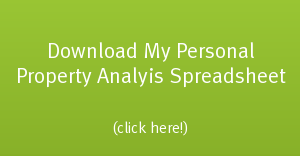This article is part three in a four part series on Getting Started Investing In Real Estate (to read part one, click here or to read part two click here) I first explored the importance of gaining an educational foundation before anything else in real estate. Next, I explained the necessity of creating a plan so you are not wandering like the Old Testament Hebrews in the desert. Today, it’s time to formulate the criteria for the house you will be searching for.
What Your First Investment Should Look Like
Your first purchase should be your own home. However, in the words of Robert Kiyosaki and his Rich Dad Poor Dad book, “Your home is not an asset. It is a liability”. In other words, a typical home – while it may increase in value over time – is not an investment. It will usually end up taking money out of your pocket, not putting money into it. That’s not to say it isn’t important, but how can you combine the need for shelter with an investment that makes sense?
Simply, don’t follow the blind masses and go search for that perfect home with the white picket fence that pushes the bounds of what you can afford. You will have plenty of life ahead of you for that home and much more if you desire. However, if you want to build a solid foundation for using real estate to fund your life adventures, you need to buy the correct house that is an asset to you and fits with your investment plan.
What should I buy?
I recommend that you look into a small multifamily building such as a duplex, triplex, or 4-plex.
Why?
A small multifamily property has several distinct reasons for making it the ideal first purchase.
- Easy To Finance: Multifamily properties with 2-4 units are as easy to finance as single-family homes. You can get into a home for around 3.5% down payment and ask the bank to pay the closing costs. If the property is already filled with tenants, you will also receive the security deposits from the existing tenants when you take over.
- Easy to Gain Experience: Multifamily properties will get your feet wet in the landlord business. I’m not saying you need to be the one fixing toilets at 3 a.m. (see my 5 Tips for Hassle-Free Tenant Management). However, the experience you gain from these small units will translate into a lifetime of headache saving skills.
- Easy to Cashflow: When starting out in Real Estate, your goal should be to get your cashflow as high as possible. This means the money that goes out in bills must be much less than the money coming in. As landlord – you get to keep the difference. This is cashflow. Multifamily homes are generally much easier to get good positive cashflow on, thus they are the perfect tool to get you out of your day job and on with your life.
- Less Competition: Small multifamily houses are outside the radar to most home buyers, so the law of supply and demand is on your side in getting a killer deal. Less competition = a better deal for you.
Are you going to fail miserably if you go out and buy a typical single family home as your first purchase? No. However, the financial benefits of a multifamily home will put you far ahead in your investing career and set you up for a higher likelihood of success. Tomorrow’s post will be the last in this series and will focus on the actual steps to purchase your first home.
Leave a comment below and then click here to go to part four in this series “Getting Started Investing in Real Estate”
P.S. looking for hard money loans in California? Be sure to check out my friends over at northcoastfinancialinc.com. They have very competitive rates, can fund within a week and specialize in fix and flip loans and other hard money loans.
 If this is your first time here at Real Estate In Your Twenties.com - welcome!
If this is your first time here at Real Estate In Your Twenties.com - welcome! 





